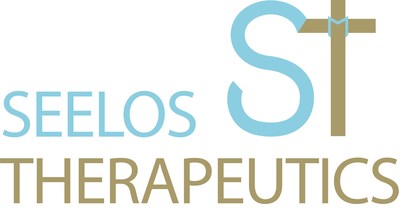Seelos Therapeutics, Inc., a clinical-stage biopharmaceutical company focused on the development of therapies for central nervous system disorders and rare diseases, announced it has received European Orphan Drug Designation for SLS-005 in amyotrophic lateral sclerosis from the European Medicines Agency Committee for Orphan Medicinal Products.
NEW YORK, May 27, 2021 /PRNewswire/ -- Seelos Therapeutics, Inc. (Nasdaq: SEEL), a clinical-stage biopharmaceutical company focused on the development of therapies for central nervous system disorders and rare diseases, today announced it has received European Orphan Drug Designation for SLS-005 in amyotrophic lateral sclerosis (ALS) from the European Medicines Agency (EMA) Committee for Orphan Medicinal Products (COMP).
Under orphan designation in the European Union (EU), Seelos stands to benefit from several incentives such as protocol assistance, reduced regulatory fees and market exclusivity. European guidelines for Orphan Drug Designation are for diseases affecting not more than five in 10,000 people in the EU.
In November, SLS-005 was granted Orphan Drug Designation from the U.S. Food and Drug Administration (FDA) for ALS. SLS-005 was previously granted Orphan Drug Designation from the FDA and EMA for Spinocerebellar Ataxia Type 3 (SCA3), Sanfilippo syndrome and Oculopharyngeal Muscular Dystrophy (OPMD). SLS-005 has also been granted Fast Track designation from the FDA for OPMD.
About Amyotrophic Lateral Sclerosis (ALS)
According to the National Institute of Neurological Disorders and Stroke, amyotrophic lateral sclerosis (ALS) is a group of rare neurological diseases that mainly involve the nerve cells (neurons) responsible for controlling voluntary muscle movement. In ALS, both the upper motor neurons and the lower motor neurons degenerate or die and stop sending messages to the muscles. Unable to function, the muscles gradually weaken, start to twitch (called fasciculations), and waste away (atrophy). Eventually, the brain loses its ability to initiate and control voluntary movements. The disease is progressive, meaning the symptoms get worse over time. The majority of ALS cases (90 percent or more) are considered sporadic. This means the disease seems to occur at random with no clearly associated risk factors and no family history of the disease. Although family members of people with sporadic ALS are at an increased risk for the disease, the overall risk is very low, and most will not develop ALS.
Most people with ALS die from respiratory failure, usually within 3 to 5 years from when the symptoms first appear. However, about 10 percent of people with ALS survive for 10 or more years. Currently, there is no cure for ALS and no effective treatment to halt or reverse the progression of the disease.
About Trehalose
Trehalose is a low molecular weight disaccharide (0.342 kDa) that crosses the blood brain barrier, stabilizes proteins and, importantly, activates autophagy, which is the process that clears material from cells. In animal models of several diseases associated with abnormal cellular protein aggregation or storage of pathologic material, it has been shown to reduce aggregation of misfolded proteins and reduce accumulation of pathologic material. Trehalose activates autophagy through the activation of Transcription Factor EB (TFEB), a key factor in lysosomal and autophagy gene expression. Activation of TFEB is an emerging therapeutic target for a number of diseases with pathologic accumulation of storage material.
Forward Looking Statements
Statements made in this press release, which are not historical in nature, constitute forward-looking statements for purposes of the safe harbor provided by the Private Securities Litigation Reform Act of 1995. These statements include, among others, those regarding the incentives that Seelos expects to receive in connection with receiving Orphan Drug Designation for SLS-005. These statements are based on Seelos' current expectations and beliefs and are subject to a number of factors and uncertainties that could cause actual results to differ materially from those described in the forward-looking statements. Risks associated with Seelos' business include, but are not limited to, the risk that Seelos does not receive the incentives associated with receiving Orphan Drug Designation for SLS-005, the risk of Seelos not successfully executing its preclinical and clinical studies and not gaining marketing approvals for its product candidates, the risks associated with the implementation of a new business strategy, the risks related to raising capital to fund Seelos' development plans and ongoing operations, risks related to Seelos' current stock price, risks related to the global impact of COVID-19, as well as other factors expressed in Seelos' periodic filings with the U.S. Securities and Exchange Commission, including its Annual Report on Form 10-K and Quarterly Reports on Form 10-Q. Although we believe that the expectations reflected in our forward-looking statements are reasonable, we do not know whether our expectations will prove correct. You are cautioned not to place undue reliance on these forward-looking statements, which speak only as of the date hereof, even if subsequently made available by us on our website or otherwise. We do not undertake any obligation to update, amend or clarify these forward-looking statements, whether as a result of new information, future events or otherwise, except as may be required under applicable securities laws.
Contact Information:
Anthony Marciano
Head of Corporate Communications
Seelos Therapeutics, Inc. (Nasdaq: SEEL)
300 Park Avenue
New York, NY 10022
(646) 293-2136
anthony.marciano@seelostx.com
https://seelostherapeutics.com/
https://twitter.com/seelostx
https://www.linkedin.com/company/seelos
![]() View original content to download multimedia:http://www.prnewswire.com/news-releases/seelos-therapeutics-receives-european-orphan-drug-designation-for-sls-005-trehalose-in-amyotrophic-lateral-sclerosis-als-301300414.html
View original content to download multimedia:http://www.prnewswire.com/news-releases/seelos-therapeutics-receives-european-orphan-drug-designation-for-sls-005-trehalose-in-amyotrophic-lateral-sclerosis-als-301300414.html
SOURCE Seelos Therapeutics, Inc.
Company Codes: NASDAQ-NMS:SEEL





